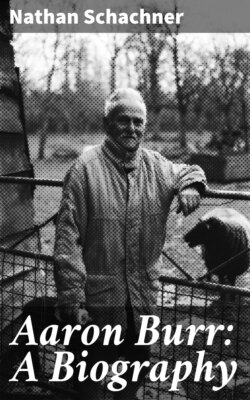Читать книгу Aaron Burr: A Biography - Nathan Schachner - Страница 17
На сайте Литреса книга снята с продажи.
5. The Footsteps of His Fathers
ОглавлениеTable of Contents
In such wise the summer of 1773 slipped by. With the coming of a sterner season, more serious thoughts intruded. It was time now to consider the future, the making of a career. As far as Timothy Edwards, his guardian, was concerned, the matter was settled. Nor did any other thought enter the heads of the whole tribe of Edwards, the more distantly related Burrs, the Faculty of Princeton, or of his numerous friends.
Aaron Burr was to become a minister of the gospel. His ancestry, his education, his uprearing, tradition, all imperiously demanded it. Already, back in May of 1772, while he was still a Senior in College, Samuel Spring, in the first flush of divinity studies, had hoped “to see the time when you will feel it to be your duty to go into the same study with a desire for the ministry. Remember, that was the prayer of your dear father and mother, and is the prayer of your friends to this time.”[54]
It was hard for a lad of seventeen to oppose the expressed desires of those he respected and loved, and the even more crushing, if invisible, influences of form and tradition. There are no evidences that at any time he had been deeply religious, or possessed of the emotional, ecstatic nature of his immediate forbears. Such traits were foreign to his cool, analytical mind and reserved habits. His resistance to the pressure of the mob in the revival at Princeton had proved that.
Furthermore, he had read extensively, and seemingly a good part of that browsing had been done in books that were tinged with the spirit of skepticism and inquiry emanating thus early from the cosmopolites of France. A faint shudder of disgust must have passed over him at the thought of himself in decent black.
Nevertheless he trod for the moment the well-worn path of duty and conformity. He would at least give the matter a trial. So he repaired to the home of Dr. Joseph Bellamy, at Bethlehem, Connecticut, for instruction and guidance into the sacrosanct mysteries of the Presbyterian theology. The good Dr. Bellamy had been an apt pupil of Jonathan Edwards, and was himself by now a famous preacher and even more famous inductor into the ministry. His home had gradually assumed the proportions, if not the dignity, of a theological seminary.
He was pleased to receive Aaron into the bosom of his family in the autumn of 1773. Nor was Timothy Edwards, who had not long before closed his house in Elizabethtown and moved back to Stockbridge, less satisfied. His young ward must have sorely puzzled and perturbed the reverend gentleman; he had frankly given up all thoughts of restraint for a considerable period. But now, evidently, things were shaping up quite well.
It took Aaron Burr only a little while, however, to discover that the pursuit of chaste theology was not for him. The worthy doctor was an honorable, if somewhat indiscreet, instructor. He liked to employ the Socratic method for the purpose of testing the validities of the Calvinist dogma. This was a dangerous procedure with a lad of Burr’s stamp. The theologian was evidently no match for his keen-witted pupil, whose weapons of debate had been tempered in the fires of the French philosophers, for soon Burr was writing with youthful exuberance to Matthias Ogden that he had Dr. Bellamy “completely under [his] thumb.”[55]
Exuberance soon passed, however, and gave way to calmer and more considered reflections. The narrow path of Presbyterianism, the repressions preached by its great exemplars, the eradication of so much of life and humanity in the process, repelled him on this closer examination. “The road to heaven,” he was convinced, “was open to all alike.”[56] The keys were not irrevocably given to any one set of dogmas. Accordingly, and with mutual protestations of good will, he quit his mentor in the early summer of 1774.
Religion thereafter became for him a purely personal and private affair, not to be discussed in public or to be the subject of argument. He has been accused time and again of being an atheist. Perhaps he was—there is no manner of telling. Certainly his life was not put into the mold of any revealed gospel, nor was it at any time guided by the hope of rewards or fear of punishments in a hereafter. It is true that he attended a fashionable church in New York in afteryears, but that doubtless was a formal concession to the requirements of the time.[57]
It is probable, however, that he was a Deist, in the sense that Jefferson and Franklin were. It was a vague, comfortable phrase that could cover a great deal of inner skepticism. Surprisingly, the important figures of that period were not much given to prayer and religious observances. The old Gods had changed; new ones were taking their place.
